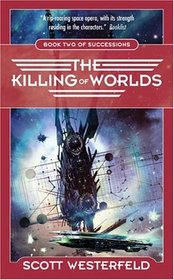I had wanted to read something written by this author for quite some time. Scott Westerfeld's book reminds me of "Battlestar Gallactica" only in that it is a juxtaposition of talking/politics and wartime, in sort of, IMHO, like submarine-like conditions. Did I like it. My genre, though NOT my place/space in the SF genre. It WAS interesting enough that it kept me reading it thru to the end, for curiosity, and good story line. A well-written book. I'm just more of a Mercedes Lackey, John Scalzi and Catherine Asaro "sf" reader. Good book though. It really deserves more stars than I am giving it, however, honesty IS. It just isn't my sf book-type, but I recognize it really is a very excellent book.
As I mentioned in my review of The Risen Empire, this isn't really a sequel -- it's merely the second half of the story, which was broken up for publishing reasons. Unfortunately, it suffers more from this break-up than most novels do, because as far as I can tell Westerfeld did nothing to make the transition more seamless -- the epilogue of The Risen Empire is the prologue of The Killing of Worlds and otherwise the story just jumps right back into the action where it left off.
Were the books in one volume (like, say the omnibus edition the Science Fiction Book Club put out) I doubt I would have even noticed when one stopped and the other started. However, I was reading the mass market Tor editions, and even though I picked up The Killing of Worlds the very next day, I was already a little out of the rhythm of the story. Everyone's decisions felt too weighted, too fraught with dire import for what my subconscious brain insisted (based on the evidence in my hands) was the start of a plot arc. The Risen Empire started with a plot-bang, a frenetic action sequence, and that worked wonderfully because my subconscious likes that sort of opening to a story; The Killing of Worlds started with an emotional-bang, a horrified Nara Oxham realizing the extent to which the Emperor will go to eliminate an embarassment and protect a secret, and that just doesn't work for my subconscious because at the beginning of a story that sort of hand-wringing doesn't feel deserved.
Clearly, it is deserved because of all that went on in The Risen Empire, but the physical mechanics of turning the pages when so few were in my left hand and so many were in my right just threw me out of things.
Once past that initial adjustment phase, however, The Killing of Worlds is exactly as good as The Risen Empire. The stakes spiral ever higher, complications arise, and no seeming victory is ever safe. The heart of the story is still the snippets from ten years earlier (Imperial Absolute); I particularly loved the section where Nara and Laurent went sledding. The pacing is sure and the climax wonderful, as all the disparate elements come back into play forging a resolution that fits just right, no matter how deeply you press it looking for holes. This is a near-perfect story, one I am sure I will return to again and again.
Were the books in one volume (like, say the omnibus edition the Science Fiction Book Club put out) I doubt I would have even noticed when one stopped and the other started. However, I was reading the mass market Tor editions, and even though I picked up The Killing of Worlds the very next day, I was already a little out of the rhythm of the story. Everyone's decisions felt too weighted, too fraught with dire import for what my subconscious brain insisted (based on the evidence in my hands) was the start of a plot arc. The Risen Empire started with a plot-bang, a frenetic action sequence, and that worked wonderfully because my subconscious likes that sort of opening to a story; The Killing of Worlds started with an emotional-bang, a horrified Nara Oxham realizing the extent to which the Emperor will go to eliminate an embarassment and protect a secret, and that just doesn't work for my subconscious because at the beginning of a story that sort of hand-wringing doesn't feel deserved.
Clearly, it is deserved because of all that went on in The Risen Empire, but the physical mechanics of turning the pages when so few were in my left hand and so many were in my right just threw me out of things.
Once past that initial adjustment phase, however, The Killing of Worlds is exactly as good as The Risen Empire. The stakes spiral ever higher, complications arise, and no seeming victory is ever safe. The heart of the story is still the snippets from ten years earlier (Imperial Absolute); I particularly loved the section where Nara and Laurent went sledding. The pacing is sure and the climax wonderful, as all the disparate elements come back into play forging a resolution that fits just right, no matter how deeply you press it looking for holes. This is a near-perfect story, one I am sure I will return to again and again.




